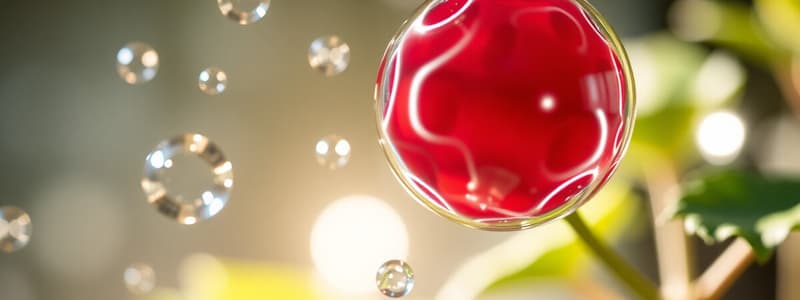Podcast
Questions and Answers
What role does a photon of light energy play in the light-dependent reactions of photosynthesis?
What role does a photon of light energy play in the light-dependent reactions of photosynthesis?
- It binds to NADP+ to form NADPH.
- It initiates the Calvin cycle.
- It catalyzes the splitting of water molecules.
- It excites an electron in a chlorophyll molecule. (correct)
What happens to chlorophyll during the light-dependent reactions?
What happens to chlorophyll during the light-dependent reactions?
- It produces ribulose bisphosphate (RuBP).
- It donates electrons to an electron transport chain. (correct)
- It absorbs protons from the surrounding medium.
- It converts sunlight into chemical energy directly.
Which molecule is primarily generated by the light-dependent reactions to store energy for later use?
Which molecule is primarily generated by the light-dependent reactions to store energy for later use?
- 3-PGA
- RuBP
- ATP (correct)
- Glucose
How is NADPH formed during the light-dependent reactions?
How is NADPH formed during the light-dependent reactions?
What is the primary purpose of splitting water molecules in the light-dependent reactions?
What is the primary purpose of splitting water molecules in the light-dependent reactions?
Which enzyme is responsible for catalyzing the carbon fixation stage of the Calvin cycle?
Which enzyme is responsible for catalyzing the carbon fixation stage of the Calvin cycle?
What is generated as a result of the electron transport chain in the light-dependent reactions?
What is generated as a result of the electron transport chain in the light-dependent reactions?
What is the significance of the Calvin cycle in C3 plants?
What is the significance of the Calvin cycle in C3 plants?
What is the primary role of NADPH in the reduction phase of the Calvin cycle?
What is the primary role of NADPH in the reduction phase of the Calvin cycle?
In C4 plants, where does the Calvin cycle take place?
In C4 plants, where does the Calvin cycle take place?
What happens to the majority of G3P molecules produced in the Calvin cycle?
What happens to the majority of G3P molecules produced in the Calvin cycle?
Which enzyme is responsible for fixing CO2 in the mesophyll cells of C4 plants?
Which enzyme is responsible for fixing CO2 in the mesophyll cells of C4 plants?
How do CAM plants minimize photorespiration effectively?
How do CAM plants minimize photorespiration effectively?
What is the initial product formed from the fixation of CO2 in C4 plants?
What is the initial product formed from the fixation of CO2 in C4 plants?
Which process do CAM plants use to ensure that CO2 is available for photosynthesis during the day?
Which process do CAM plants use to ensure that CO2 is available for photosynthesis during the day?
Which statement accurately describes the journey of malate in C4 plants?
Which statement accurately describes the journey of malate in C4 plants?
Flashcards
Light-dependent reactions
Light-dependent reactions
The first stage of photosynthesis, requiring sunlight and occurring in the thylakoid membranes.
Photosystem
Photosystem
A group of pigment molecules and proteins that absorb light energy, initiating the light-dependent reactions.
Electron excitation
Electron excitation
A chlorophyll electron absorbs light energy, becoming energized and breaking free from the chlorophyll molecule.
ATP
ATP
Signup and view all the flashcards
NADPH
NADPH
Signup and view all the flashcards
Carbon Fixation
Carbon Fixation
Signup and view all the flashcards
RuBP
RuBP
Signup and view all the flashcards
Calvin Cycle
Calvin Cycle
Signup and view all the flashcards
Reduction in Photosynthesis
Reduction in Photosynthesis
Signup and view all the flashcards
Regeneration of RuBP
Regeneration of RuBP
Signup and view all the flashcards
C4 Plants
C4 Plants
Signup and view all the flashcards
Bundle-Sheath Cells
Bundle-Sheath Cells
Signup and view all the flashcards
PEP Carboxylase
PEP Carboxylase
Signup and view all the flashcards
CAM Plants
CAM Plants
Signup and view all the flashcards
Organic Acid Storage
Organic Acid Storage
Signup and view all the flashcards
Study Notes
Light-Dependent Phase of Photosynthesis
- Light-dependent reactions require sunlight, occurring in thylakoid membranes within chloroplasts
- Photosystems are groupings of pigments and proteins in thylakoid membranes
- Pigment molecules absorb photons (packets of light energy)
- Chlorophyll absorbs light, excites an electron
- Excited electron escapes from chlorophyll
- A water molecule splits to replace lost electron; releasing oxygen and hydrogen ions
- Energy from sunlight stored in energy carriers ATP and NADPH
- ATP and NADPH carry energy to the Calvin cycle
- ATP loses a phosphate, NADPH loses hydrogen to become lower-energy ADP and NADP+
Generating an Energy Carrier (ATP)
- Light energy stored by ATP and NADPH
- Phosphate bond used for energy storage / release
- ATP and NADPH lose atoms becoming ADP and NADP+ during energy release to Calvin Cycle
Generating Another Energy Carrier (NADPH)
- Light re-energizes electron in photosystem I using another photon
- Electron Energy formation of NADPH from NADP+ and hydrogen ions (H+)
- Stored solar energy used in making sugar molecules
The Dark Reactions (Calvin Cycle in C3 Plants)
- Divided into three stages: carbon fixation, reduction, and regeneration
- Carbon fixation: CO2 combines with RuBP (five-carbon molecule); catalyzed by Rubisco
- Reduction: ATP and NADPH used to convert 3-PGA into G3P (three-carbon sugar)
- Regeneration: 5 G3P molecules recycled to regenerate RuBP (requires ATP)
The Dark Reactions in C4 Plants
- Light-dependent and Calvin cycle physically separated (mesophyll and bundle sheath cells)
- CO2 fixed into 4-carbon acid (oxaloacetate) in mesophyll cells, then transported to bundle sheath cells
- Malate releases CO2, enters Calvin Cycle, generates sugar
- No photorespiration
The Dark Reactions in CAM Plants
- Light-dependent and Calvin cycle separated temporally (day/night)
- CO2 absorbed at night, stored as organic acids (oxaloacetate or malate)
- Stomata closed during day, organic acids break into CO2 and enter Calvin Cycle.
Studying That Suits You
Use AI to generate personalized quizzes and flashcards to suit your learning preferences.




